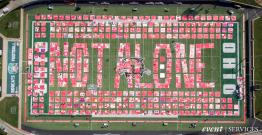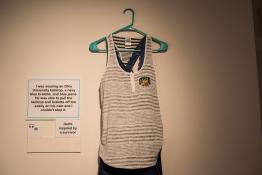
In This Space: Disrupted

Go directly to: How to Get Involved
The arts-based survivor programs provide an opportunity to: centralize survivor stories in our understanding of sexual, dating, and domestic violence, and stalking; place the onus of prevention to fall on perpetrators rather than survivors; combat rape myths and stigma; and build empathy within our community for survivor stories.

The 2020 fall exhibit, In This Space: Disrupted will focus on geographies of space. It is organized and sponsored by the Women’s Center, Survivor Advocacy Program, Health Promotion, Ohio University Art Galleries, Ohio Women, Ohio University Alumni Association, and with support from Counseling and Psychological Services. We are asking survivors to join us in making visible the places and spaces in which sexual assault, domestic violence, dating violence, stalking, and harassment occur and how we, as a society, can create spaces of healing. The organizers encourage participation from all survivors, of all identities and backgrounds.
Further Background: Our hope for this project is to make visible the often-anonymous spaces in which interpersonal violence occurs – in public and private – and to create opportunities for survivors to reclaim and occupy space. By creating this visibility, we hope it instills awareness in viewers and is a call to action that challenges static narratives that the media often portrays as representing interpersonal violence and survivors.
We felt called to action on this theme because we frequently hear popular narratives that indicate that sexual violence happens only in particular spaces, perpetrated by particular people. We are also committed to considering how this narrative also shapes our understanding of other forms of interpersonal violence. We problematize this singular narrative, and we hold close the idea that space/place is experienced differently and that those who are often most marginalized experience space/place in ways often not articulated in mainstream media. By creating this exhibit, we hope to demonstrate shared experiences, as well as demonstrate disruptions in those similarities.
Invitation to Participate
Ohio University’s Women’s Center and our collaborating partners (Survivor Advocacy Program, Health Promotion, Ohio University Art Galleries, Office of Instructional Innovation, and Ohio Today) invite you to join us in creating an arts-based survivor-center exhibition. You may download our handout, with further instructions, here.
Timeline
If you are interested in contributing, please notify us by June 3, 2020. Participation in the exhibit is capped, so please contact us as soon as you are interested. Your contributions should be returned to the Survivor Advocacy Program by July 13, 2020.
How to Get Involved
Email survivor.advocacy@ohio.edu with your mailing address to be mailed a package that includes fabric, fabric markers, and instructions. The return label on the package will say “Survivor Advocacy Program, Lindley Hall 038, Athens, OH 45701.” You may wish to contact an advocate either by email or phone (740) 597-SAFE(7233) to discuss precautions regarding the package if it is being delivered somewhere that could cause you to disclose your survivor status unwillingly, or if you are concerned that your abuser may be monitoring your mail. We will include a prepaid return label for you to return your contribution to the exhibit. The prepaid label will only work if you keep your contribution under 3 lbs. weight. We ask that everyone who receives a package participate, or return the package and unused return label so that others can participate, as limited opportunities are available.
If you choose to contribute, your contribution may be represented in print, online, and in marketing. Once you have contributed, your contribution will not be returned and becomes the property of the exhibit.
Prompts
Contributions should be from your own perspective. We ask that you not tell another’s story, but only your own. We ask that contributors use the following prompts to inform their contribution. While your contribution may respond to multiple prompts, you will be asked to choose which prompt your contribution most closely responds to.
Prompts for Survivors:
-
In this Space: Without specifically naming the location, where did your experience of interpersonal violence occur? What physical space were you in? How may that have differed from where you believed these acts occurred? What feelings do you associate with that space now? Guidelines: For example, be general when describing the location; you can say “residence hall”, but if you name a specific residence hall, we are required to report to Equity and Civil Rights Compliance.
-
Healing Space: Following your experience of interpersonal violence, how did you create space to heal? What did your process of healing look like? What spaces helped you heal? What spaces exist for you as safe? What feelings do you associate with healing spaces?
-
Claim Space: If you have, or could, claim space as your own (physical/geographic, your own bodily autonomy, protest movements, etc.), what space would you make for you, your experience, and your survival? How would you change the spaces that are said to be created for you? (For consideration, we recommend reading An Open Letter from Black Women to the SlutWalk, available through Alden Library for Ohio University)
-
Dangerous Space: What spaces have been retraumatizing?
-
Safe Space: How does the public’s idea of dangerous (alleyways, bars, fraternity parties) and safe (home, in groups) space for survivors’ align with your experiences? What is different? What is similar?
Prompts for Co-survivors
Co-survivors of interpersonal violence (co-survivors are defined as those who are key support for the primary survivor, e.g. friends, family, partners) who want to participate should partner with a survivor, and should only share experiences with the survivors’ consent and input, with the following prompts in mind:
-
Hold Space: How do you dedicate yourself to holding space for survivors?
-
Disrupt Space: How do you disrupt unsafe spaces in support of survivors? How do you define unsafe spaces? How are you an effective bystander in unsafe spaces?
Ideas for Your Contribution
In relation to the prompt you choose, we suggest any of the following (and encourage your own creative contribution!): A drawing of the space/place, a word cloud, a poem, manipulation of the fabric panel up to the parameters provided in the instructions (ripping, tearing, dirtying, etc.), iron-on transfers, applique, embroidery, painting. You may feel inspired by viewing submissions to The Monument Quilt.
Guidelines
We ask that contributors follow the instructions included in this package, as they have been designed to allow for the contributions to be displayed properly. Failure to follow these guidelines may result in your contribution not being included in the exhibit. Do NOT include any of the following in your contribution:
-
specific locations,
-
identifying information (including pictures of any identifying features or locations),
-
and names of perpetrators.
You may include your name on the return label.
This exhibit provides an opportunity for connection among survivors. Providing general information, rather than specific locations and people, also creates space for other survivors to potentially see themselves reflected in your contribution - letting them know that they are not alone.
Additionally, because naming locations, perpetrators, etc., may result in viewers identifying contributors, guidelines have been created to protect the anonymity of those participating. You may include your name on the return label.
Mandatory Reporting
This program has received an exemption from mandated reporting in order to allow for full-campus participation by all members of the campus community. Disclosures of incidents of sexual misconduct will not be considered notice to Ohio University.
Questions?
If you have questions that relate to your experience and how that may be shared through the prompts, we recommend contacting Survivor Advocacy Program at survivor.advocacy@ohio.edu. Survivor Advocacy Program is a confidential resource and exempt from mandatory reporting through the university. If you have general questions about the exhibit, prompts, and/or display, you may contact the Women’s Center at womenscenter@ohio.edu. The Women’s Center is not a confidential resource.
Resources:
Ohio University offices are operating remotely until further notice, so please use phone or email to contact them rather than presenting to their physical office space.
Students on the Athens Campus seeking confidential resources should contact: Survivor Advocacy Program: Lindley Hall 038; 740-597-SAFE(7233); Counseling and Psychological Services: Hudson Health Center, 3rd Floor; (740) 593-1616; and/or Campus Care at 740-592-7100. Additional resources for regional and extension campuses can be found at: https://www.ohio.edu/pacsm/resources
Ohio University employees and community members seeking confidential resources should contact the Survivor Advocacy Outreach Program: 77 East State Street Athens, OH 45701, Toll-Free: 888-597-SAOP (7267); and/or the Employee Assistance Program: 1-800-227-6007.
To report sexual misconduct to Ohio University, contact the Office of Equity and Civil Rights Compliance: Lindley Hall 006; 740-593-9140; equity@ohio.edu AND/OR click on the “Report Sexual Misconduct” tab at: https://www.ohio.edu/equity-civil-rights.
Additional reporting options are listed on the Survivor Advocacy Program’s website at: https://www.ohio.edu/survivor/options/reporting.
24/7 Telephone Hotlines (National):
-
National Sexual Assault Telephone Hotline: 1-800-656-HOPE (4673)
-
National Domestic Violence Hotline: 1-800-799-SAFE (7233)
-
United Way Crisis Helpline 1-800-233-HELP (4357)